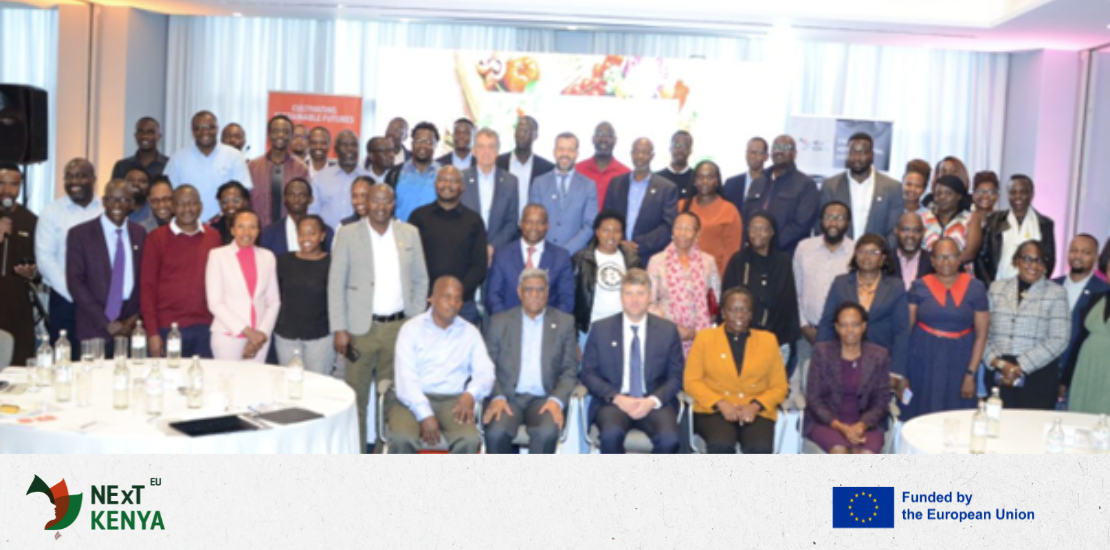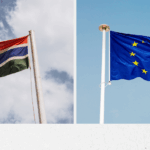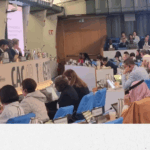- 08/04/2025
- Posted by: Sandra Borma
- Category: Uncategorized

The closing workshop of the NExT Kenya (New Export Trade Kenya) programme took place in Nairobi on 28 March 2025, marking the end of a five-year journey to strengthen horticultural value chains in Kenya. Led by COLEAD and funded by the European Union to the tune of €5 million, the programme brought together a wide range of public and private partners to address key challenges in the sector, while laying the foundations for long-term transformation.
A resilient programme in a turbulent context
Launched in 2020, the programme unfolded in a highly volatile environment: the COVID-19 pandemic, the war in Ukraine, new regulatory frameworks (such as the EU Green Deal) and climate disruption. Despite these challenges, NExT Kenya was able to adapt its interventions through an integrated and participatory approach. Notable results include: Increased market share of Kenyan fresh fruit and vegetables in European markets; Overall growth in horticultural export volumes, including to regional markets; Significant progress in food safety, social inclusion and environmental sustainability among supported enterprises; Long-term capacity building of local stakeholders, from public institutions to private operators.
Key lessons for the future
The programme has generated key lessons to strengthen the impact and sustainability of future initiatives:
- Participatory approaches and local ownership: Co-developing interventions with beneficiaries, especially SMEs and cooperatives, fostered strong engagement and relevance.
- Holistic value chain vision: Interventions spanned all levels – from national policy frameworks to on-farm practices.
- Building resilience: Combined solutions – including training, tools, policy dialogue and access to finance – helped address climate and market uncertainties.
- Engaging youth, women and marginalised groups: Involving these groups from the outset created powerful levers for more equitable growth.
- Networking and synergies: Multi-stakeholder platforms such as the National Standing Committee on Horticulture enabled sharing, innovation and strategic alignment.
A committed public private partnership
During the workshop, COLEAD highlighted the exemplary commitment of its many partners, including:
- The Government of Kenya and its relevant agencies (KEPHIS, PCPB, KALRO, MINAGRI…),
- Professional and inter-professional organisations (KFC, FPEAK, FPC, ASOK…),
- Training institutions, service providers and cooperatives,
- Technical and financial partners, exporters, buyers and NGOs.
A horticultural master plan for sustainable growth
A major achievement was the identification of 122 bottlenecks along horticultural value chains. The analysis, conducted by the National Horticulture Standing Committee, will inform a Horticulture Master Plan – a strategic roadmap for the next decade. The aim is to double horticultural exports from KES 156 billion to over KES 300 billion within 10 years through better market management, simplified regulations, enhanced compliance with regulations in destination markets (e.g. SPS) and effective governance.
What’s next for NExT Kenya?
The final workshop was not the end, but the beginning of a new chapter. The tools, networks and capacity that have been developed provide a strong foundation to move forward: Responding to evolving regulations (e.g. SPS) and market dynamics; Innovating to meet climate challenges; Consolidating inclusive and sustainable growth.
COLEAD remains committed to working with sector stakeholders to make Kenyan horticulture a model of competitiveness, resilience and inclusion.
Asante sana! Let’s build on NExT Kenya’s legacy together.
This activity is implemented by COLEAD and supported by the NExT Kenya (New Export Trade) programme, established in collaboration with the EU Delegation in Nairobi and Kenyan stakeholders. This publication has been produced with the financial support of the EU. Its contents are the sole responsibility of COLEAD and can under no circumstances be regarded as reflecting the position of the EU.





